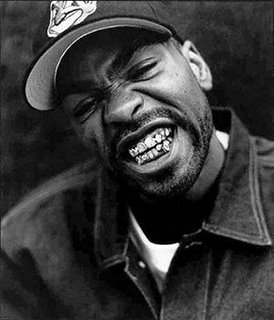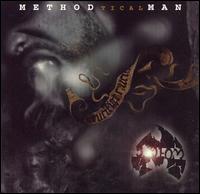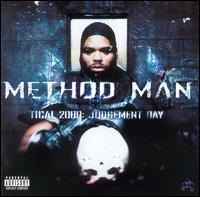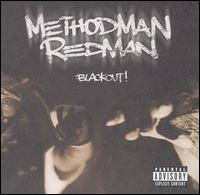 Method Man was the first — and biggest — solo star to emerge from the groundbreaking Wu-Tang Clan. His mush-mouthed, sandpaper-rough bellow (at times recalling EPMD's Erick Sermon) and imaginative rhymes easily made him one of the most recognizable, unpredictable MCs in the group, yet his flow was more deliberate and laid-back than The Wu's resident loose cannon, Ol'Dirty Bastard. On his solo records, Method Man developed a persona that swung from offhand, understated menace to raucous stoner humor. Toward the end of the '90s, his frequent team-ups with Redman produced not only a terrific musical chemistry, but an eventual big-screen comedy team as well.Method Man was born Clifford Smith on April 1, 1971, in Hempsted, Long Island; he split his childhood between his father's Long Island residence and his mother's Staten Island home. It was the latter locale where he met his future Wu-Tang cohorts RZA, Genius/GZA, and Ol'Dirty Bastard; when they set about forming a hip-hop collective in the early '90s, Method Man was one of the first to sign on. Meth was heavily featured on the group's classic late-1993 debut Enter The Wu-Tang (36 Chambers), even getting his own showcase track with "Method Man," which certainly put him out front in terms of name recognition. Thanks to The Wu's innovative contract — which allowed individual members to sign solo deals with whatever label they chose — Method Man inked a contract with Def Jam, and in 1994, approximately one year after Enter The Wu-Tang's release, he became the first Wu member to release a solo album with Tical. Highly anticipated, the album entered the charts at number four and quickly went platinum, while singles like "Bring the Pain" (which just missed the pop Top 40) and "Release Yo' Delf" made him an even bigger name in the hip-hop community. He began making numerous guest appearances on other artists' records and in the summer of 1995, his one-off single with Mary J. Blige, "I'll Be There for You/You're All I Need to Get By," soared into the pop Top Five, giving Meth his first major mainstream exposure.
Method Man was the first — and biggest — solo star to emerge from the groundbreaking Wu-Tang Clan. His mush-mouthed, sandpaper-rough bellow (at times recalling EPMD's Erick Sermon) and imaginative rhymes easily made him one of the most recognizable, unpredictable MCs in the group, yet his flow was more deliberate and laid-back than The Wu's resident loose cannon, Ol'Dirty Bastard. On his solo records, Method Man developed a persona that swung from offhand, understated menace to raucous stoner humor. Toward the end of the '90s, his frequent team-ups with Redman produced not only a terrific musical chemistry, but an eventual big-screen comedy team as well.Method Man was born Clifford Smith on April 1, 1971, in Hempsted, Long Island; he split his childhood between his father's Long Island residence and his mother's Staten Island home. It was the latter locale where he met his future Wu-Tang cohorts RZA, Genius/GZA, and Ol'Dirty Bastard; when they set about forming a hip-hop collective in the early '90s, Method Man was one of the first to sign on. Meth was heavily featured on the group's classic late-1993 debut Enter The Wu-Tang (36 Chambers), even getting his own showcase track with "Method Man," which certainly put him out front in terms of name recognition. Thanks to The Wu's innovative contract — which allowed individual members to sign solo deals with whatever label they chose — Method Man inked a contract with Def Jam, and in 1994, approximately one year after Enter The Wu-Tang's release, he became the first Wu member to release a solo album with Tical. Highly anticipated, the album entered the charts at number four and quickly went platinum, while singles like "Bring the Pain" (which just missed the pop Top 40) and "Release Yo' Delf" made him an even bigger name in the hip-hop community. He began making numerous guest appearances on other artists' records and in the summer of 1995, his one-off single with Mary J. Blige, "I'll Be There for You/You're All I Need to Get By," soared into the pop Top Five, giving Meth his first major mainstream exposure.  Shortly thereafter, another duet — this time with Def Jam labelmate Redman — on the compilation track "How High" climbed into the pop Top 20.Wu-Tang Clan reconvened in 1997 for the double-album Wu-Tang Forever, and about a year later, another round of solo projects commenced. Method Man issued his sophomore effort, Tical 2000: Judgement Day (ironically), in late 1998 and took a more expansive approach this time out, filling the album with between-song skits and a variety of guest rappers and producers. Tical 2000 was another hit, entering the charts at number two. Meanwhile, in addition to recording the album, Meth had spent much of 1998 getting his acting career off the ground; after landing a few bit parts, he made his first prominent big-screen appearance in Hype Williams' Belly. In 1999, Meth partnered up with Redman to form a duo act that hit the road with Jay-Z's Hard Knock Life tour; they also entered the studio together to record the collaborative album Blackout!, which entered the charts at number three that fall and received highly complimentary reviews.The Wu returned in late 2000 with the lower-profile The W. After completing the record, Meth refocused on his acting career; in early 2001, he put in a month's worth of appearances portraying a young gangster on HBO's gritty prison drama Oz, and teamed up with Redman for the Cheech & Chong - styled stoner comedy How High, which hit theaters toward the end of the year, around the same time as the fourth Wu-Tang album, Iron Flag. After numberous delays, the MC released his third solo album, Tical 0: The Prequel, in 2004. He allegedly finished off 20 tracks with RZA as the producer, but Def Jam opted to release a version that featured only one of those cuts. In 2006 Meth issued 4:21...The Day After, which featured appearances from many Wu-Tang members, including a posthumous verse from ODB.
Shortly thereafter, another duet — this time with Def Jam labelmate Redman — on the compilation track "How High" climbed into the pop Top 20.Wu-Tang Clan reconvened in 1997 for the double-album Wu-Tang Forever, and about a year later, another round of solo projects commenced. Method Man issued his sophomore effort, Tical 2000: Judgement Day (ironically), in late 1998 and took a more expansive approach this time out, filling the album with between-song skits and a variety of guest rappers and producers. Tical 2000 was another hit, entering the charts at number two. Meanwhile, in addition to recording the album, Meth had spent much of 1998 getting his acting career off the ground; after landing a few bit parts, he made his first prominent big-screen appearance in Hype Williams' Belly. In 1999, Meth partnered up with Redman to form a duo act that hit the road with Jay-Z's Hard Knock Life tour; they also entered the studio together to record the collaborative album Blackout!, which entered the charts at number three that fall and received highly complimentary reviews.The Wu returned in late 2000 with the lower-profile The W. After completing the record, Meth refocused on his acting career; in early 2001, he put in a month's worth of appearances portraying a young gangster on HBO's gritty prison drama Oz, and teamed up with Redman for the Cheech & Chong - styled stoner comedy How High, which hit theaters toward the end of the year, around the same time as the fourth Wu-Tang album, Iron Flag. After numberous delays, the MC released his third solo album, Tical 0: The Prequel, in 2004. He allegedly finished off 20 tracks with RZA as the producer, but Def Jam opted to release a version that featured only one of those cuts. In 2006 Meth issued 4:21...The Day After, which featured appearances from many Wu-Tang members, including a posthumous verse from ODB.Method Man - Tical (1994)
The first Wu-Tang Clan solo album to follow the seismic impact of Enter The Wu-Tang , Method Man's Tical similarly delivers an otherworldly wallop, one that instantly sets the madcap MC apart from his clansmen as the collective's shining star. Not only is Meth madcap, both in terms of mentality and delivery, he's also incredibly witty and wordy. Here he inspires hilarity as well as astonishment, and the way that he fires off his rhymes with such seemingly spontaneous ease compounds this sense of wonder. Just as Meth is quite clearly leagues above practically every other rapper in 1994 sans a small handful, if that, so is his producer, Wu-Tang abbot RZA, who produces the entirety of Tical: from the antiquated flutes and kung fu flick samples that open the album, to the pulse-accelerating beats of "Bring the Pain" and the fist-pumping ones of "All I Need" (the b-boy version rather than the radio-geared one featuring Mary J. Blige), to the rallying, warlike horns of "Release Yo' Delf." Despite a few outside contributions, most notably from Raekwon on the rowdy spar-fest "Meth vs. Clef," Tical is strictly a two-man show, Meth bringing da ruckus and RZA the swarming soundscapes, and that's precisely what further makes this album such a treasure amid the many Wu-Tang gems. Where most of Meth's clansmen delivered guest-laden albums that sounded more like group efforts than solo ones, Tical strictly spotlights the group's two stars and does so with refreshingly straightforward flair. There's none of the epic overreaching that mars so many rap albums of the era; rather, there's just over a dozen tracks here, and they're filled to the brim with rhymes and beats and little else — no pop-crossover concessions nor any heady experimentation for the sake of experimentation, just good ol'-fashioned hip-hop, albeit with a dark, dark deranged twist.
Method Man - Tical 2000: Judgement Day (Nov 10, 1998)
Unlike Method Man's straightforward debut, Tical, which was a simple yet brilliant MC/producer collaboration, and a classic one at that, his follow-up, Tical 2000, is an ambitious undertaking, involving a long list of collaborators and a conceptual scope. In many ways, it's a much more interesting album than its predecessor because of its ambitions. There are 28 tracks in total here, most of them featuring some sort of guest, mainly fellow East Coast hardcore rappers like Redman but also surprise guests like Chris Rock and Janet Jackson. The 28 tracks furthermore feature an abundance of producers rather than just RZA like last time. Some of the more notable contributors include Rockwilder, Erick Sermon, Prince Paul, and The Trackmasters as well as in-house Wu-Tang beatmakers RZA and True Master. This large cast navigates its way through a loose narrative about a so-called Judgement Day that seems to liberally take its inspiration from the film Terminator 2: Judgment Day. All of this makes Tical 2000 a daunting venture that is occasionally entertaining (the many skits), intermittently brilliant ("Dangerous Grounds" and the climactic title track), but unfortunately too often ill-conceived (the overly calculated "All I Need" sequel "Break Ups 2 Make Ups," this time featuring D`Angelo rather than Mary j> Blige) and also tiresome (again, the many skits). Rarely have such ambitious undertakings as this worked well for rap artists, and Tical 2000 exemplifies this, as did many of the myriad other epic, often double-disc albums released during the late '90s that were heavy on collaborators but light on consistency. Hand it to Meth, though, for embarking on such a visionary engagement, for its final completion winded him so much that he'd take a few years off before even considering another solo endeavor.
Method Man - Blackout! (Sep 28, 1999)
Hip-hop fans have known for years that Method Man and Redman are two of the top MCs in the field, and their tour together not only proved the fact, but also showed they rap incredibly well together. Their deliveries are similar and the flow never falters, but the hint of gravel in Meth's voice makes them easily distinguishable. Now, with Blackout!, the duo's first album together (though both guested on each other's 1998 LPs), listeners have the proof on wax. Skating on top of spare, hard-hitting productions by Erick Sermon, Wu-Tang's RZA, Mathematics, and Redman himself — under his Reggie Noble alias — Meth and Redman trade off on hardcore rhymes and freestyle over each other. There's barely room for breath, but the rhymes are tight and inventive throughout. There are only two guest appearances (for Ja Rule & LL Cool J on "4 Seasons" and Ghostface and Street on the hilarious Blair Witch Project send-off "Run 4 Cover"), and the focus on just Meth and Redman makes for an even tighter, more combustible LP. Even with the high expectations that come along with a project of this magnitude Blackout! rarely disappoints.
Method Man - Tical 0: The Prequel (May 18, 2004)
Method Man's third solo work, following 1998's uneven Tical 2000 (and released a month after Ghostface's superior-in-every-aspect Pretty Toney Album), arrived with many conflicting rumors and circumstances attached to it. On the M2 program Spoke 'n' Heard, Meth informed journalist/host Touré that Tical 0 is his best record, and alluded to being boxed in when working with one producer and one sound. Around the same time, the official Wu-Tang website reported that the MC was not pleased with the version Def Jam opted to put out, due to its scant number of RZA productions — one single cut, when an entire record's worth was allegedly put together throughout the past couple years. Whatever the circumstances might be, there's no doubt that Tical 0 is even less penetrating than Tical 2000, a record that at least had its ambitions to retain interest during the lulls. At its best, this one offers brief bursts of okay-to-decent tracks. The most energizing moments typically come when Meth's supported by the likes of Busta Rhymes ("What's Happenin'") and Ludacris ("Rodeo"), but the productive conveyor belt of guest spots — which chucks out well over a dozen of them, including Missy Elliot, Raekwon, Kardinal Offisha, Chinky (not Chingy), and soon-to-be fellow sitcom star Redman — also weighs down the whole process. Likewise, the list of producers comes pretty close to being lengthier than the list of guest MCs; this makes the record seem unfocused and disjointed, not diverse and well rounded. Meth seems more clear-headed than ever, possibly a result from his cleaned-up, family-oriented lifestyle. (The lyrical matter, however, does nothing to reflect this change.) His throaty rasp isn't nearly as doped out as it was a decade prior, but his personality remains an attraction. As an MC, he's had nothing to prove for quite some time. Give or take a couple hot tracks, this release is not likely to play a significant role in his legacy.
Method Man - 4:21... The Day After (Aug 29, 2006: Def Jam)
 Ever since the release of the somewhat disappointing Tical 0: The Prequel, Method Man has been trying to prove that he really is the MC he was on his fantastic 1994 solo debut. So maybe the fact that he decided to name his fourth record 4:21...The Day After has less to do with marijuana (though of course that is never completely forgotten) and more to do with moving away from all the comparisons to his first album, Tical (and the subsequent Tical-themed titles that came after). And while 4:21 may be an improvement over his previous releases, Method Man's not quite the funny yet insightful rapper he was on his debut. To his credit, however, there are still some pretty good tracks on the album, including "Say," with a Lauryn Hill-covering-Bob Marley sample; "Dirty Mef," which has a verse from deceased Clansman Ol' Dirty Bastard; and "Walk On" featuring cohort Redman, and when Method Man spits out "Me and my soldier, we're taking over/taking payola from all those stations and record labels" over a beat by RZA and Erick Sermon (both of whom appear multiple times), you almost believe that he's going to make a comeback. Unfortunately, there are enough songs on 4:21 that are so utterly boring that the claim of redemption can't be made quite yet. "Got to Have It" is trite and almost hypocritical; the balladic "Let's Ride," which features a chorus from Ginuwine, is completely uninventive; and the closer, "4 Ever," with labelmate Megan Rochell, sounds as if it's trying to capture the energy he and Mary J. Blige had on "I'll Be There for You/You're All I Need to Get By," but ends up seeming more like an empty radio track. There is some good production on the album (besides RZA and Erick Sermon, Scott Storch, Kwamé "K1Mil" and Mathematics all contribute beats), and there are some decent verses as well, both from Method Man and his myriad of guest stars, but they're lacking some of the punch and ingenuity of Tical. Longtime fans should be happy to hear that he's sounding better, but he's going to have to keep making improvements if he wants to win over many new ones.
Ever since the release of the somewhat disappointing Tical 0: The Prequel, Method Man has been trying to prove that he really is the MC he was on his fantastic 1994 solo debut. So maybe the fact that he decided to name his fourth record 4:21...The Day After has less to do with marijuana (though of course that is never completely forgotten) and more to do with moving away from all the comparisons to his first album, Tical (and the subsequent Tical-themed titles that came after). And while 4:21 may be an improvement over his previous releases, Method Man's not quite the funny yet insightful rapper he was on his debut. To his credit, however, there are still some pretty good tracks on the album, including "Say," with a Lauryn Hill-covering-Bob Marley sample; "Dirty Mef," which has a verse from deceased Clansman Ol' Dirty Bastard; and "Walk On" featuring cohort Redman, and when Method Man spits out "Me and my soldier, we're taking over/taking payola from all those stations and record labels" over a beat by RZA and Erick Sermon (both of whom appear multiple times), you almost believe that he's going to make a comeback. Unfortunately, there are enough songs on 4:21 that are so utterly boring that the claim of redemption can't be made quite yet. "Got to Have It" is trite and almost hypocritical; the balladic "Let's Ride," which features a chorus from Ginuwine, is completely uninventive; and the closer, "4 Ever," with labelmate Megan Rochell, sounds as if it's trying to capture the energy he and Mary J. Blige had on "I'll Be There for You/You're All I Need to Get By," but ends up seeming more like an empty radio track. There is some good production on the album (besides RZA and Erick Sermon, Scott Storch, Kwamé "K1Mil" and Mathematics all contribute beats), and there are some decent verses as well, both from Method Man and his myriad of guest stars, but they're lacking some of the punch and ingenuity of Tical. Longtime fans should be happy to hear that he's sounding better, but he's going to have to keep making improvements if he wants to win over many new ones.Click To Download
Stay tune......Rapaholic™ As Salam Aleikum




No comments:
Post a Comment